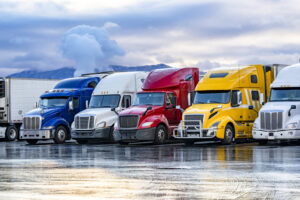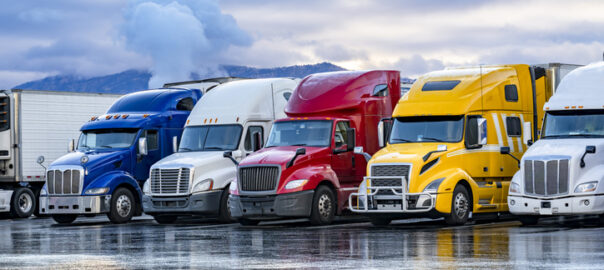Choosing whether to lease or buy a truck does not have to be complicated. Many fleet owners lease their trucks, while others buy them outright. Often, the choice between leasing or buying comes down to the intended purpose of the truck and how much money you want to spend.

There are some factors to consider when deciding to lease or buy a commercial truck. Read below to learn more about truck buying and leasing options.
Things to Consider
Adding a truck to a fleet is not something to jump into without considering a few things first. Answer these questions to help you determine your best option.
- How much money do you expect to spend on monthly payments and a security deposit?
- Will the freight the truck haul be enough to make a lease payment?
- How many miles do you expect to get out of the vehicle?
- What are the available funding options for both purchase and lease agreements?
Deciding Between New or Used Trucks
Once you have considered your financing options and the future business use of the truck, you can choose whether to get a new or used truck.
Used trucks
There are some drawbacks when adding a used truck to your fleet. Buying a used truck can be more cost-effective in the beginning stages. However, a used truck can develop issues as it acquires more miles. Also, when buying a used truck, you have to keep in mind the depreciation.
Another disadvantage to buying or leasing a used truck is that often, these trucks have a minimal warranty if any at all. Some used truck dealers to sell their vehicles “as-is.”
Buying or leasing a truck “as-is” means the dealer has no responsibility to fix the truck after the papers have been signed. However, there are many well-maintained used trucks available that are still a great deal. Ensure these trucks have been serviced regularly and have low mileage for the purchase price.
New trucks
The initial upfront and sales tax cost of buying or leasing a new truck is a lot higher than a used truck. However, a new truck comes with a factory warranty. Factory warranties cover significant problems that arise during the warranty period.
Choosing to buy a new truck from a dealership also ensures you are getting the latest in mechanical technology. Modern trucks are more fuel-efficient and can save money on operating costs. Newer heavy-duty trucks also use catalytic reduction, which reduces the stress on the engine.
When deciding between buying or leasing a new or used truck, remember the miles you plan to get out of it and how much money you want to put into it. If you run a high-volume fleet, a new truck is typically the best option. However, used trucks can be an option for farmers or small businesses running minimal mileage.
Pros and Cons of Leasing a Truck
There are two possibilities to choose from when it comes to leasing a truck: a conventional lease or leasing to purchase. A conventional lease is much like rent; you pay monthly lease payments without an agreement to an end purchase price. If you are leasing to purchase a truck, you own the truck at the end of the leasing period.
Advantages and disadvantages of conventional leases
With a conventional lease agreement, the leasing company is obligated to repair the truck if it becomes damaged or breaks down. Another upside to a conventional lease is a smaller down payment. Conventional lease payments are often cheaper than purchase payments. If, at any point, you decide to buy the truck, you may be able to purchase it at a reduced price.
However, no matter how the lease term is, it never becomes yours unless you agree to make purchase arrangements. You cannot upgrade the truck without approval, or it can void the lease contract. Since you are leasing instead of buying the truck, it never builds equity either.
Pros and cons of a lease to purchase agreement
Lease-to-purchase arrangements are commonly seen as contracts between big trucking companies and their drivers. Leasing from an employer gives you the freedom of an owner-operator. You can decide what loads to take and how long you are out on the road.
Many trucking companies who offer the lease-to-buy option require the truck to be serviced by their service technicians only. Leasing to buy is typically a good thing, considering the company you are leasing from will usually maintain and repair the truck at a less expensive rate.
On the other hand, the exclusive servicing requirement could be restrictive if you are out on the road when the truck breaks down. You then may need to call the company to have the truck towed to their terminal.
Another downside to a lease-to-buy arrangement is it is your responsibility to ensure the truck hauls enough merchandise to pay the lease payment. If the truck is not running enough merchandise to pay the monthly payment, the trucking company can repossess the truck.
Pros and Cons of Buying a Truck
There are obvious benefits to buying a truck outright, but there is a downside, too. Read below to weigh the pros and cons of buying a truck.
Advantages of buying a truck
One of the biggest pros to buying a truck is that you own it. You can modify and use the truck as you wish. Since you are buying it, the truck will build equity and can be used as a tax write-off. Also, you can take a loan out on the truck, trade it in, or sell it if needed.
Another benefit of buying a truck is that commercial truck insurance is typically cheaper than insurance on a leased truck. Depending on your credit score and cash amount, some loan companies may not require a down payment when buying the truck.
Disadvantages of buying a truck
When owning a truck, the insurance and repair bills are your responsibility. If you buy a truck from a finance company, they may require a certain amount of insurance coverage to protect their investment. These requirements can raise the cost of insurance. If the truck you bought did not come with a factory warranty, you might be faced with outrageous repair bills if something significant breaks down on the truck.
Tax Considerations
Finally, there are taxes to take into consideration. You can consult a tax professional before committing to leasing or buying a truck. The type of commercial vehicle you are leasing or buying and the agreed price can have a direct bearing on how much tax you must pay. Often, leasing or buying a truck can be used as a tax write-off. Ensure you are informed of all tax considerations before agreeing to lease or buy any commercial vehicle.


